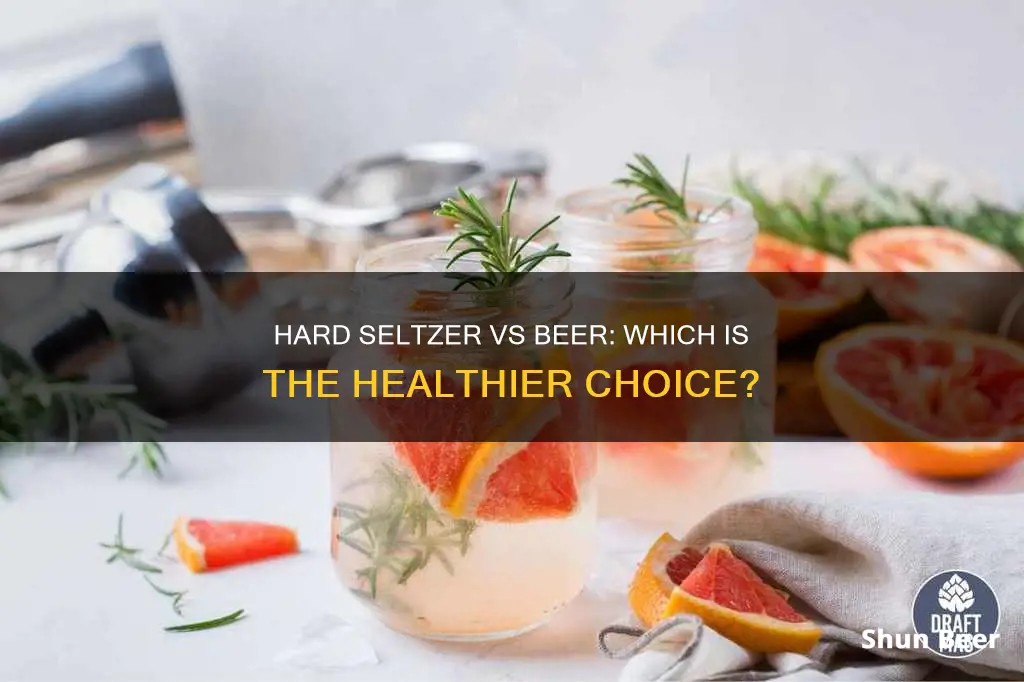
White Claw is a hard seltzer brand that has become increasingly popular in recent years, especially among health-conscious consumers. With its light and refreshing taste, natural fruit flavouring, and low-calorie content, it is often perceived as a healthier alternative to beer. However, the question of whether White Claw is truly healthier than beer is complex and depends on various factors. While White Claw generally contains fewer calories and carbohydrates than beer, it is still an alcoholic beverage, and excessive consumption can lead to similar long-term health effects as beer or other alcoholic drinks. Additionally, the perception of White Claw as a healthy option may lead people to consume more of it, potentially negating any potential health benefits.
| Characteristics | Values |
|---|---|
| Calories | Hard seltzers have fewer calories than beers, but this is not always the case. Some beers, like Beck's Premier Light, are less caloric than some hard seltzers. |
| Carbohydrates | Hard seltzers have fewer carbohydrates (about 2 carbs) than beers, which have a much wider range. |
| ABV | Hard seltzers and beer are similar, with both having around 5% ABV. However, beers can have a lower ABV, such as 2.3% in Beck's Premier Light, or a much higher one, such as 8% in some Bud Light Lime beers. |
| Gluten | Hard seltzers are typically gluten-free due to the lack of grains in their fermentation process. |
| Vitamins and Minerals | Beers may contain vitamins and minerals that hard seltzers do not because of the grains used in their production. |
What You'll Learn

Hard seltzers have fewer calories and carbohydrates than beer
The difference in calorie and carbohydrate content between hard seltzers and beer is mainly due to the ingredients used in their production. Hard seltzers are often made with brewed cane sugar and/or malted rice, along with carbonated water and flavourings, while beer is made with grains like barley, maize, rye, or corn. The specific grain used in beer contributes to its colour and flavour.
The varying brewing processes also contribute to health-related differences between hard seltzers and beer. Hard seltzers, which are made with fermented sugars rather than fermented grains, are typically gluten-free. This makes them a good option for individuals with gluten sensitivities.
While hard seltzers have fewer calories and carbohydrates than beer, it's important to note that neither drink can be considered inherently "healthy" due to their alcoholic content. Alcohol, regardless of the source, has been linked to various long-term health effects when consumed in excess.
Additionally, the lower calorie and carbohydrate content of hard seltzers may give consumers the impression that they are making a healthier choice, leading them to drink more than they typically would. It's important to remember that alcohol should always be consumed in moderation and that neither hard seltzers nor beer can be considered nutritious.
Soju vs Beer: Which Booze is Better for Your Health?
You may want to see also

Hard seltzers are gluten-free
Some hard seltzer brands explicitly state that their products are made with "naturally gluten-free ingredients". For example, Truly Hard Seltzer is crafted with "simple, naturally gluten-free ingredients". Similarly, White Claw states on its website that its hard seltzer is "made with naturally gluten-free ingredients".
It is important to note that not all hard seltzers are gluten-free. Some may use malted barley as the alcohol base, which contains gluten. Therefore, it is always important to check the ingredients label and look for a gluten-free symbol on the packaging.
Gluten-removed hard seltzers are not the same as gluten-free hard seltzers and should be avoided by those with a gluten intolerance or a gluten-free lifestyle.
Beer vs. Ramen: Which is Healthier?
You may want to see also

Beer has vitamins and minerals that hard seltzers lack
While hard seltzers like White Claw have fewer calories and are often marketed as a healthy drinking alternative, beer has vitamins and minerals that hard seltzers lack. Beer is considered a fairly nutritious beverage, and its primary vitamins are usually B-complex vitamins. Each serving of regular beer can provide between 5 and 10 percent of the daily value of vitamins like folic acid, niacin, riboflavin, and vitamin B-6. B-complex vitamins are essential water-soluble nutrients that need to be consumed daily to maintain health. They help the body make energy from food and can also help prevent a variety of diseases. Additionally, beer contains minerals such as phosphorus, iodine, magnesium, and potassium, and is rich in calcium, which can benefit bone health.
The presence of grains in the fermentation process gives beer more nutrients than hard seltzers, which are typically gluten-free due to the absence of grains. While hard seltzers are generally lower in calories, it's important to note that some beers, like Beck's Premier Light, are technically less caloric than some seltzers. However, when considering the more popular options, hard seltzers tend to have a lower calorie count than beers.
In conclusion, while hard seltzers may be marketed as a healthier alternative, beer provides a range of vitamins and minerals that are lacking in hard seltzers. However, it's important to drink in moderation, as excessive consumption of any alcoholic beverage can lead to negative health consequences.
Vodka Soda vs Beer: Which Drink is Healthier?
You may want to see also

Hard seltzers are more drinkable, which can lead to increased consumption
Hard seltzers, such as White Claw, have become increasingly popular in recent years, with many people viewing them as a healthier alternative to beer. While hard seltzers do tend to have fewer calories and carbohydrates than beer, they are not necessarily healthier. In fact, the increased drinkability of hard seltzers can lead to increased consumption, which may have negative health consequences.
One of the main reasons why hard seltzers are more drinkable than beer is their lower calorie and carbohydrate content. Hard seltzers typically contain around 100 calories and 2 grams of carbohydrates per 12-ounce can, while beers can range from 64 to 300 calories and 5 to 20 grams of carbohydrates per serving. This lower calorie and carb count makes hard seltzers appealing to health-conscious consumers who are looking to cut down on their calorie intake.
Another factor contributing to the drinkability of hard seltzers is their lack of gluten. Most beers contain gluten, which can give consumers a bloated feeling. In contrast, hard seltzers are typically gluten-free, which means they won't leave you feeling as full or bloated as beer. This can make it easier to drink more without feeling as full or experiencing the same level of negative side effects as you would with beer.
The fruity flavours of hard seltzers also contribute to their drinkability. Unlike beer, which can have a strong or bitter taste, hard seltzers come in a variety of fruity flavours, such as lime, strawberry, passionfruit, and pomegranate. These flavours can be more appealing to consumers, especially those who are not used to the taste of alcohol. The fruity flavours can also mask the taste of alcohol, making it harder to detect how much you have consumed.
While hard seltzers may be more drinkable than beer, it's important to remember that they still contain alcohol, which is not good for your health. The lower calorie and carb count of hard seltzers may give consumers a false sense of security, leading them to drink more than they normally would. Additionally, the fruity flavours and carbonation can make hard seltzers go down easier, increasing the risk of overconsumption.
In conclusion, while hard seltzers may be lower in calories and carbohydrates than beer, their increased drinkability can lead to increased consumption. This can have negative health consequences, as alcohol, in any form, is not good for your health. It's important to drink in moderation, whether you're consuming hard seltzers, beer, or any other alcoholic beverage.
Beer and Teeth: Friend or Foe?
You may want to see also

Excess alcohol consumption leads to long-term health issues
While hard seltzers like White Claw have been marketed as a healthier alternative to beer, it's important to remember that neither is truly healthy due to their alcoholic content. Excessive alcohol consumption, whether it's beer or hard seltzer, can lead to long-term health issues.
Excessive drinking includes binge drinking, heavy drinking, drinking during pregnancy, or drinking by people under the age of 21. Binge drinking is defined as four or more drinks for women or five or more drinks for men during an occasion, while heavy drinking is defined as eight or more drinks for women or 15 or more drinks for men in a week.
The excessive consumption of alcohol can have detrimental effects on both physical and mental health. Alcohol is a toxin that the liver has to flush out, and heavy drinking can lead to liver damage and scarring, known as cirrhosis. It can also result in alcoholic fatty liver disease, indicating that the liver is not functioning optimally.
Long-term alcohol abuse is associated with an increased risk of several types of cancer, including cancers of the mouth, throat, voice box, oesophagus, liver, breast, and intestines. The risk of certain cancers, such as breast cancer in women, increases with any amount of alcohol consumption.
In addition to the increased cancer risk, excessive alcohol use can lead to high blood pressure and alcohol use disorder, which affects both physical and mental health. It weakens the immune system, making individuals more susceptible to illnesses. Heavy drinking is also linked to mental health conditions, including depression, anxiety, and dementia, as it affects the brain's communication pathways, making it more challenging to think, speak, remember, make decisions, and control body movements.
The excessive consumption of alcohol can also result in social and wellness issues, causing relationship problems with family and friends. It can lead to learning difficulties and create challenges in school or work.
It's important to remember that drinking less alcohol is better for your health than drinking more. Lowering alcohol consumption can improve overall health and well-being and reduce the risk of alcohol-related health issues.
Draft Beer: Healthier Choice or Marketing Myth?
You may want to see also
Frequently asked questions
White Claw has fewer calories and carbohydrates than beer, but it still contains alcohol, so it's not a healthy drink. Excess alcohol consumption can lead to long-term health issues such as high blood sugar, heart disease, and liver disease.
White Claw is made from carbonated water, natural fruit flavouring, and alcohol. The alcohol is made from fermented cane sugar, which is gluten-free.
No, both White Claw and beer typically have an alcohol content of around 5% ABV.
White Claw is often marketed as a healthier alternative to beer, with fewer calories and carbohydrates. It is also gluten-free and seen as a clean source of alcohol.
White Claw has fewer calories and carbohydrates than beer, but it is important to remember that it is still an alcoholic drink. Excessive consumption of any alcoholic beverage can lead to negative health effects.







